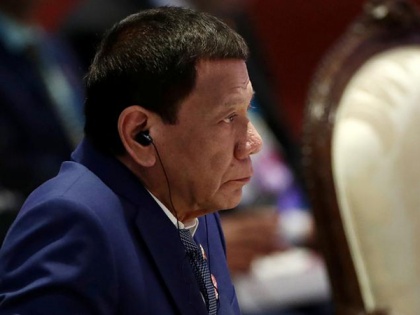China's rising assertiveness made it impossible for Philippines' Duterte to advance pro-Beijing foreign policy: Report
By ANI | Published: May 25, 2021 04:57 PM2021-05-25T16:57:08+5:302021-05-25T17:05:02+5:30
China's rising assertiveness in the South China Sea and challenges to the Philippines' internationally recognized maritime claims have made it practically impossible for President Rodrigo Duterte to advance his Beijing-leaning foreign policy agenda, Asia Times reported.

China's rising assertiveness made it impossible for Philippines' Duterte to advance pro-Beijing foreign policy: Report
China's rising assertiveness in the South China Sea and challenges to the Philippines' internationally recognized maritime claims have made it practically impossible for President Rodrigo Duterte to advance his Beijing-leaning foreign policy agenda, Asia Times reported.
According to Asia Times, the fundamental problem with Duterte's China policy is his "naive forward-deployment" of key concessions to China in exchange for a package of still unfulfilled Chinese pledges.
The concessions range from downplaying the 2016 arbitral tribunal award to downgrading security cooperation with the US.
Duterte is powerful in setting domestic policies but in terms of foreign policy he has never enjoyed unilateral power, according to the report.
He has had to repeatedly contend with multiple veto-players, including the Chinese-Filipino business community as well as the powerful defense establishment.
Since Duterte came to office in 2016, he has nurtured closer ties with China and has openly shown his disdain towards Washington, even threatening to end the US-Philippine military alliance.
China in return has militarized the South China Sea disputes, establishing a sprawling network of massive military bases and airstrips on contested land features, while stepping up maritime militia deployment to Philippine-claimed territories and waters in recent years.
Duterte is powerful in setting domestic policies, especially his controversial drug war, but in terms of foreign policy he has never enjoyed unilateral power. He has had to repeatedly contend with multiple veto-players, including the Chinese-Filipino business community as well as the powerful defense establishment.
Duterte has been accused of being silent at a time when Chinese "maritime militia" vessels have refused to withdraw the ships from Manila's exclusive economic zone (EEZ) in the South China Sea. Several Filippino officials, including the country's top diplomat and the defence chief, have openly objected to the Chinese provocative actions.
The defence and foreign affairs ministries in the Philippines have been up in arms for a fortnight over the presence of the fishing boats suspected to be manned by Chinese maritime militia at Whitsun Reef, with statements flying back and forth over the alleged incursion into the Philippines' exclusive economic zone.
While Duterte has been reluctant to confront China over the issue, his foreign and defence secretaries have repeatedly criticised Beijing for its refusal to withdraw the ships from the disputed waters.
Duterte, instead of taking a tough stance against China, banned his cabinet from speaking out in public on the South China Sea (SCS) dispute with China.
Even after such an intensifying row, China hasn't shown any sign of relocation of the vessels. Instead, they have accused the Philippines of using a 2016 international tribunal ruling, which deprived China of certain outcrops of territorial-generating status, the ruling from the permanent court of arbitration effectively punches holes in China's all-encompassing "nine-dash" line that stretches deep into the South China Sea, as reported by the Sydney Morning Herald.
The 2016 International Tribunal Ruling denies China of its thousand years of fishing rights in the area.
China claims sovereignty over almost the entire South China Sea and has overlapping territorial claims with Brunei, Malaysia, the Philippines, Vietnam and Taiwan.
China has been increasing its maritime activities in both the South China Sea and the East China Sea over the past few months, partly in response to Beijing's concerns over the increasing US military presence in the region because of escalating Sino-US tensions.
Beijing's rising assertiveness against counter claimants in the East and South Sea has resulted in unprecedented agreement across the Indo-Pacific.
( With inputs from ANI )
Disclaimer: This post has been auto-published from an agency feed without any modifications to the text and has not been reviewed by an editor
Open in app